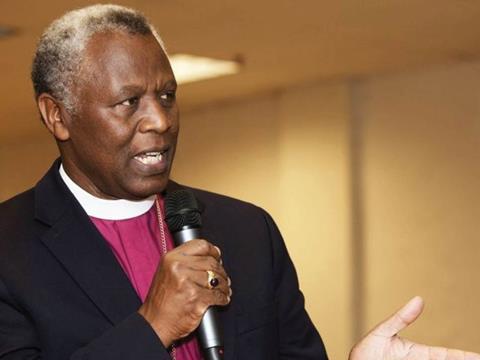Is this the long-predicted schism? Divisions over sexuality have long plagued the Anglican Communion, but according to some commentators, a full separation is now taking place. Tim Wyatt takes a closer look at Gafcon’s latest statement, which includes the revelation this group of churches will elect their own chair to replace the Archbishop of Canterbury

“The future has arrived”. So begins a momentous statement issued last week by a conservative Anglican network that claims they are ‘reordering’ the global Anglican Communion, returning it to biblical truth.
Is this a schism, or an internal power struggle between church leaders? Or is something else entirely going on?
What is the Anglican Communion?
Anglicanism was born in the 16th century, out of the conflict between Henry VIII and the Pope. Amid the backdrop of the European Reformation, Henry replaced the Pope as head of the Church and promoted leaders more in sympathy with Protestants on the continent. After decades of royal wrangling following Henry’s death, the Church of England eventually ended up as an independent compromise denomination with both Catholic and Reformed Protestant elements.
As the British Empire expanded in later centuries, Anglican missionaries travelled across the world and started churches. By the Victorian era, these Anglican churches - in countries such as the United States, Australia, India and the Caribbean - had developed into independent denominations.
The Communion gradually evolved as a family of related but independent churches. Over time, it has acquired various institutions, including a once-a-decade meeting of all Anglican bishops (known as the Lambeth Conference), a secretariat office in London, and an elected Anglican Consultative Council (ACC), which meets every three years.
However, unlike the global Catholic Church, the Anglican Communion is a looser network of affiliated but independent national churches, and there is little ability for any church or international institution to interfere with the running of another province.
What is Gafcon?
There have been many arguments between the scattered Anglican churches over the centuries, but in recent times the core disagreement has been over sexuality. In the 1980s and 1990s, the more liberal Western churches began to soften their opposition to same-sex relationships.
This prompted the 1998 Lambeth Conference to pass a (much contested) resolution which upheld traditional teaching that marriage was only for one woman and one man, and that homosexual activity was “incompatible with scripture”. However, this did not prevent the American and Canadian churches from blessing gay couples and consecrating partnered gay clergy as bishops.
Gafcon have said that their statement was not necessarily prompted by Mullally’s appointment
Conservative members of the Communion, mostly located in Africa and Asia, boycotted the 2008 Lambeth Conference in protest. Instead, they held their own Global Anglican Conference in Jerusalem (known as Gafcon) and launched the Gafcon movement as an internal pressure group.
Over the years, Gafcon has continued to condemn the liberal Anglican churches and also the Archbishop of Canterbury, the spiritual head of the Communion, for failing to rein in liberal moves to affirm gay marriage. It has also supported breakaway Anglican churches in countries where the official Anglican body is liberal.
A fresh crisis was sparked in 2023 when the CofE, the mother church of the Communion, voted in favour of blessing gay couples in church. This prompted Gafcon to declare it no longer recognised Most Rev Justin Welby, then Archbishop, as the head of the Communion.
What has Gafcon said now?
In their statement last week, Laurent Mbanda, the Archbishop of Rwanda and chair of Gafcon, said that the traditional sources of unity which hold the Communion together – including the Archbishop of Canterbury, the Lambeth Conference and the ACC – had failed to uphold the doctrine of Anglicanism and were therefore “rejected” by Gafcon.
“Gafcon has re-ordered the Anglican Communion by restoring its original structure as a fellowship of autonomous provinces bound together by the Formularies of the Reformation, as reflected at the first Lambeth Conference in 1867, and we are now the Global Anglican Communion”, it added.
Member churches must not take part in any meetings called by the Archbishop of Canterbury, nor give to or receive money from Anglican institutions such as the ACC. Indeed, Gafcon urge its members to strip any mention of being in communion with Canterbury or the CofE from their constitutional documents.
Instead, the Council of Primates (head archbishops) in the new Global Anglican Communion will elect a chair, who will act as “first among equals” in place of the Archbishop of Canterbury.
What does this mean?
At first glance, it appears Gafcon have announced a schism and that their member churches will quit the Anglican Communion and set up their own rival Global Anglican Communion. But this is probably not the case.
Since the statement was published, Mbanda and other Gafcon figures have continued to insist that they are not leaving, but instead wresting back control of the Communion from what they see as its discredited and liberal traditional sources of authority.
In a podcast interview, Mbanda said the Global Anglican Communion was not a fresh organisation, but more of a rebrand. “We never left. We are the Anglican Communion; we have had global in that name always. So, there is nothing new, except that we are making it really clear and sharp.”
In many ways, the arguments over sexuality are a proxy for a deeper debate about what defines Anglicanism itself
Instead, it was revisionist Anglicans in the West who were the true schismatics, he insisted. “Why would they accuse me of being schismatic when they are the ones who departed? We have always been there. We stay there, we continue there.”
And membership of Gafcon - and its maybe-new-maybe-not Global Anglican Communion - was open to individual dioceses and bishops, not simply whole denominations, Mbanda said. Anyone who was ready to sign the 2008 Jerusalem Declaration and commit to the Bible as their source of authority was welcome, even if their denomination was open to gay marriage.
In practice, the hard core of Gafcon churches have long since cut institutional ties with the CofE and the official Anglican Communion institutions. Many conservative Anglican churches, especially those in Africa, have boycotted multiple Lambeth Conferences and Primates’ Meetings and some have already rewritten their constitutions to remove any mention of Canterbury. So for many Gafcon member churches, life will continue much the same.
What is new is the demand that Gafcon members pick a side and stick to it. Some churches have had a foot in both camps, attending Gafcon meetings and sharing its theological perspective while also remaining partially invested in official Communion affairs. Mbanda’s statement seems to be calling for these more peripheral provinces to finally give up on the CofE and go all-in with Gafcon instead.
And while there has been an archbishop elected to chair Gafcon for many years, the new chairman will, for the first time, claim the traditional title of “first among equals” - thereby directly rivalling the new Archbishop of Canterbury, Sarah Mullally, as the de facto head of Anglicanism worldwide.
Why now?
Given the Gafcon statement is potentially less momentous and revolutionary than it first seems, some are wondering about its timing. Just two weeks ago, Mullally was unveiled as the CofE’s new archbishop.
This prompted angry condemnation from Gafcon, partly because of her gender (many but not all Gafcon churches do not accept women priests or bishops) but mostly because she supports blessing same-sex couples.
Gafcon have said that their statement was not necessarily prompted by Mullally’s appointment, and neither is the timing of their next conference, at which they will launch their renewed Global Anglican Communion. This takes place in Nigeria in March 2026, just weeks before Mullally is installed.
Back in 2023, Gafcon had already rejected Mullally’s predecessor, Justin Welby, as spiritual head of Anglicanism over his own support for gay blessings. But it seems likely that the Mullally announcement was the final trigger. With another liberal pro-LGBT Archbishop of Canterbury, Gafcon appears to have decided there is no point waiting to see if the Anglican Church in England can be persuaded back into the fold.
What will happen next?
In many ways, the arguments over sexuality are a proxy for a deeper debate about what defines Anglicanism itself. It is significant that the Gafcon statement holds up the Bible as the sole source of unity and authority for their renewed Communion.
Historically, the Anglican Communion was built on the more shifting sands of historic relationships, Victoria-era colonialism and international church structures. To some liberals, Anglicanism is an endlessly-evolving loose network of friendships across borders – you were part of it simply because you had always been in communion with these other churches and bishops from over the sea who shared a common ancestry.
But Gafcon is now pushing a very different understanding: that Anglicanism is about fidelity to scripture over Church institutions or transnational relationships.
So far, the formal response from the Anglican Communion has been muted, with a statement from its secretary general simply urging Anglicans to persist with its own more plodding reforms to international structures. And while many Gafcon voices have celebrated last week’s statement, it remains to be seen if others fully cut ties with the CofE or not.





































No comments yet